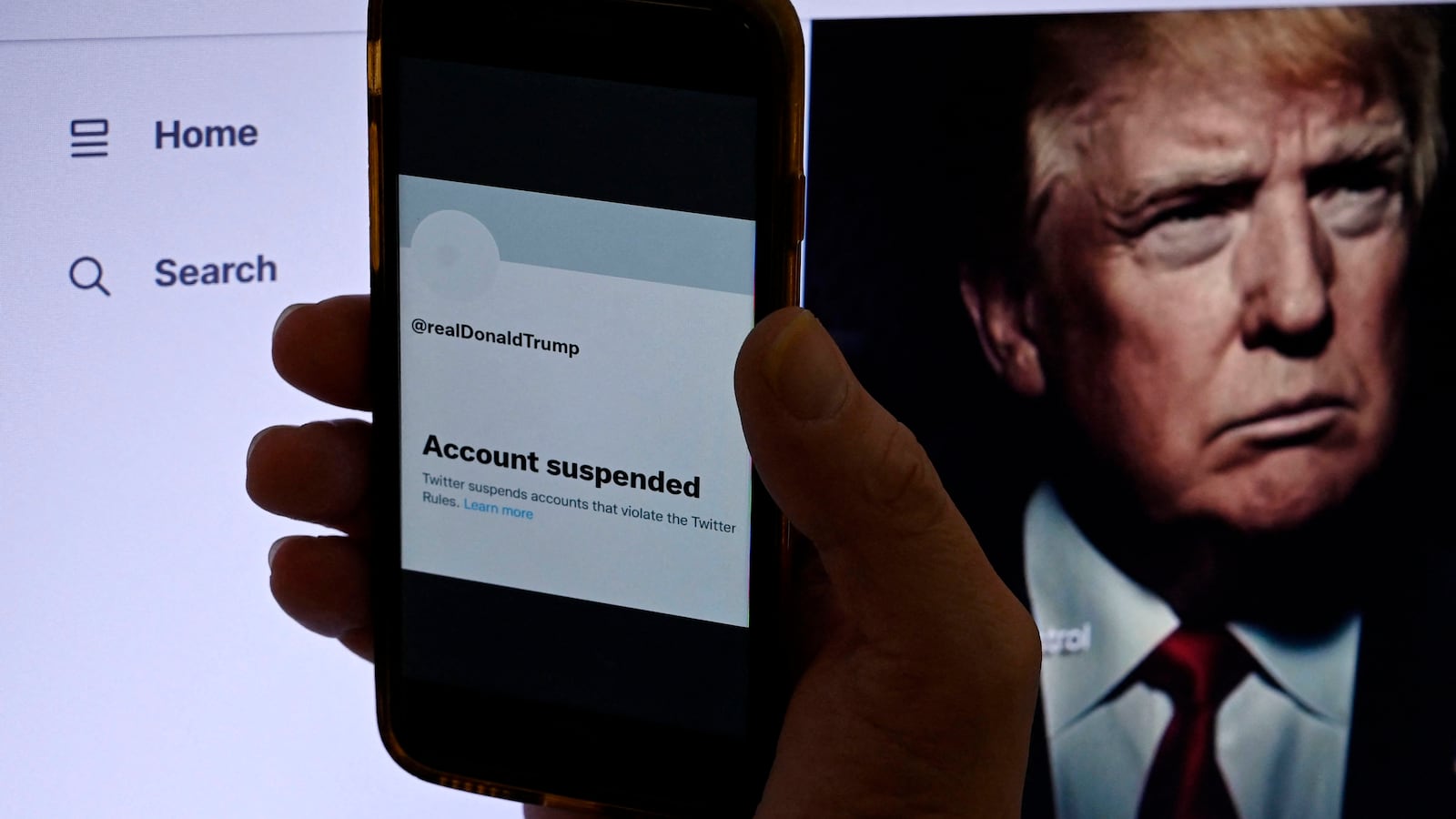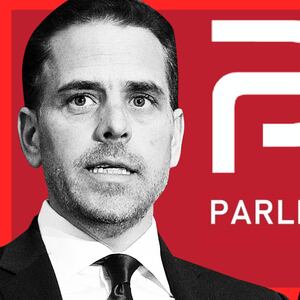Elon Musk’s Twitter purchase has worried liberals and some Twitter employees, many of whom are expected to be fired by Musk.
But at least one group of Twitter obsessives is thrilled: the pro-Trump figures kicked off the site over the past few years who now face the prospect that their lifetime bans will be lifted.
But Twitter amnesty for these MAGA exiles could have repercussions far beyond their immediate delight and could remake both the online conservative movement and the Twitter experience itself.
On Thursday, as the $44 billion deal went into effect, Bloomberg reported that Musk plans to reverse Twitter’s policy of issuing lifetime platform bans. It’s still not clear what that means for people already banned from Twitter when it was a public company, and Twitter didn’t respond to requests for comment.
Right-wing personalities banished from Twitter have spent months or, in some cases, years languishing on less popular right wing social media channels, far from the mainstream relevance and a larger audience base they once enjoyed.
On Telegram, one of the social media platforms where many figures banned from Twitter have ended up, Musk’s purchase has been a hot topic.
Ali Alexander, the Twitter-banned Jan. 6 rally organizer, assured his fellow exiles that their permanent suspensions would soon end.
“Chirp chirp bitch,” Alexander wrote, referencing Twitter’s “bird” branding.
Others who may soon be granted access to Twitter include Proud Boys founder Gavin McInnes, Trump adviser turned possible future federal prisoner Steve Bannon, hate figures Milo Yiannopoulos and Laura Loomer, MyPillow CEO Mike Lindell, and InfoWars founder Alex Jones. Musk’s purchase could also mean new prospects for movements and groups banned from Twitter when it was a public company, like the pro-Trump QAnon conspiracy theory movement.
If Musk rolls back Twitter’s bans, it could return the site to the more anarchic days of 2014 or 2016, when Gamergate trolls and attention-hungry right-wing personalities roamed free across the platform and organized harassment mobs against targets like women in the videogames industry or Saturday Night Live star Leslie Jones. That return has the potential of turning off other users, but early signs indicate it’s a risk Musk is willing to take.
These banished figures are optimistic Musk will readmit them in part because he seems more likely than other social media CEO’s to cater to the individual needs of conservative internet pundits due to Musk’s frequent interactions through his personal Twitter account with leading right-wing users. On Friday morning, Musk replied to a tweet from mega-popular conservative Twitter personality “Cat Turd” after they complained that their account was suffering from a variety of perceived discriminations, from being “ghostbanned” to “searchbanned.”
Musk took the grievance that “Cat Turd” didn’t have more followers seriously.
“I will be digging in more today,” he wrote back.
After years of Twitter terminating the accounts of leading right-wing personalities and trolls following various violations of their rules, the banned figures have taken on a sort of heroic status on the right’s fringes. They’re described as political prisoners, or “prisoners of the meme war.” As Musk’s purchase approached, one popular meme showed waves of frogs — a reference to the cartoon “Pepe the Frog” embraced by very-online Trump supporters — being set free.
“Release the political prisoners, Elon,” tweeted Tim Pool, a conservative commentator who remains on the platform.
But that self-soothing only mattered so much. In reality, a ban meant being sidelined from more mainstream discussions that remained open to ideological rivals who remained on the platform, and drastically reducing their audience.
Better-resourced conservative groups and figures banned from Twitter have been able to weather account suspensions more successfully. Undercover conservative operative James O’Keefe, who was banned along with his group Project Veritas, still manages to get his footage onto Twitter through allies and supporters who remain on the platform.
“Our presence cannot be stopped,” Project Veritas spokesman R.C. Maxwell, who goes by the name “Black Hannity,” told The Daily Beast in a text message. “Content is king.”
Still, Maxwell told The Daily Beast that O’Keefe and his group should have five Twitter accounts restored if Musk lifts their bans.
For more marginal figures, a Twitter ban could be a career death-sentence. Conservative provocateurs reliant on earning negative attention to boost their profiles could find plenty of it on Twitter. Once banned, they could be forced to resort to more elaborate, in-person stunts to keep their names in the public eye, but at the risk of alienating optics-conscious allies.
After being banned from Twitter in 2018, for example, Loomer handcuffed herself to a Twitter office door in a bid to regain her account. Loomer was widely mocked on the site, but her name also became a trending topic.
Some conservative figures who haven’t been banned from the platform see other possibilities in Musk’s purchase, too. For years, some Republicans have been convinced that Twitter’s algorithm somehow discriminates against conservatives has been an article of faith on the right (in fact, internal research suggests it favors them). The idea that Musk could somehow “publish” or “release” the algorithm, proving that conservative leaders were denied their rightful follower counts, has become intriguing.
“Expose the algorithms,” Fox News commentator Tomi Lahren tweeted on Thursday. “ALL of them!!!”
It’s not clear how far Musk will go towards lifting Twitter’s moderation policies. Would-be Twitter rivals like Gab and Parler, founded as “free speech” havens for conservatives banned from Twitter, have been forced to institute some level of moderation. In a Twitter post addressed the platform’s advertisers on Thursday, Musk appeared to concede some rules on speech will remain.
“Twitter obviously cannot become a free-for-all hellscape, where anything can be said with no consequences!” Musk wrote.
Still, Musk’s moves in the first hours of his ownership have been met with relief among the Twitter exiles. He purged Twitter’s top executives, including legal executive Vijay Gadde, who had become a despised figure on the right after defending Twitter’s moderation rules in an appearance on the popular Joe Rogan podcast and leading a team that decided to ban Donald Trump.
“WE’RE FREE BOYS,” Capitol riot participant Anthime Gionet, who goes by the name “Baked Alaska” online, wrote in a Telegram post in reaction to Gadde’s firing. “TWITTER IS OURS!”
Other banned figures aren’t waiting for Musk to set them free, instead creating new accounts to see whether Twitter will still care enough to catch them. On Thursday night, Twitter-banned conspiracy theorist Stew Peters jumped back on the platform with a new account, telling The Daily Beast that he would regain his following because of the public’s interest in following truth-telling “men with balls.” But by Friday morning, Peters’ new account was banned, too.
Conservative personalities aren’t the only ones who could return to the platform if Musk wipes Twitter’s ban slate clean. Anti-Trump brothers Brian and Ed Krassenstein amassed more than 1.5 million followers on the site in part by relentlessly replying to every Trump tweet.
The Krassensteins were banned from Twitter in 2019 for allegedly breaking Twitter rules regarding fake engagement, a charge they deny. The brothers, once ubiquitous in political Twitter circles, have seen their online engagement plummet since the ban. Now they post near-daily videos about blockchain-related companies that rarely receive more than a few dozen views.
In a text message to The Daily Beast, Brian Krassenstein said he wasn’t sure whether the brothers would be able to rebuild their followings if they were allowed to return.
“It’s too early to say at this point nor do I think we have the drive like we did in the past,” Krassenstein wrote.
The end of the bans can’t come soon enough for some. On Thursday night, shortly after the news of Musk’s executive purge broke, Loomer tried to log back into the Twitter account she lost nearly four years ago. A message was waiting for her, but it wasn’t the one she wanted to see. Her account was still permanently suspended.








